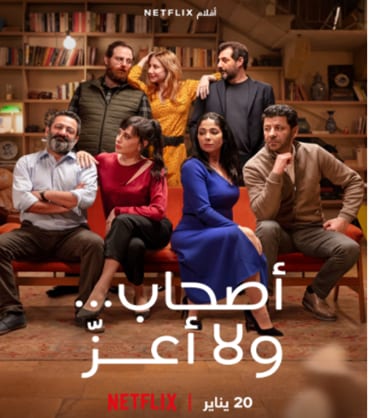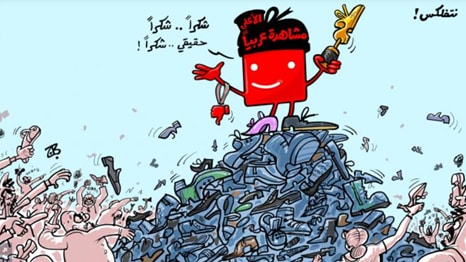On January 20, 2022 Netflix released the movie No Dearer Friends, which is an Arabic version of the Italian film Perfect Strangers and was made in collaboration with Egyptian, Emirati and Lebanese production companies. In the film, several close friends agree to show each other the messages and calls on their phones, and discover a host of secrets about each other, including that one of them is gay and that some of the married friends are having affairs. Due to this content the film caused an uproar in the Arab world and especially in Egypt, since the cast includes famous Egyptian actress Mona Zaki. In Kuwait, attorney 'Abd Al-'Aziz Al-Suba'i filed a legal complaint demanding to ban Netflix in the country,[1] and in Egypt, attorney Ashraf Farahat, founder of the "Purify Society" campaign, filed a complaint demanding to block the airing of the movie there.[2] Religious institutions also came out against the film. Al-Azhar's Global Fatwa Center issued a statement proclaiming that "homosexuality is a reprehensible abomination and moral depravity" and that "normalizing and promoting it are a crime that corrupts our identity, undermines the security of our societies and destroys the moral and social system and the institution of the family."[3]
The responses to the film in the Arab press were diverse. Its opponents claimed that it reflects Netflix's goal, as an American company, to corrupt and destroy the Arab societies by normalizing homosexuality and adultery. The proponents claimed that the film merely shows phenomena exist in Arab countries like elsewhere in the world, so that Arab societies can deal with them instead of hiding them. One writer called to stop the policy of censorship and develop a local Arab film industry that reflects the Arab reality and norms.
It should be noted that the issue of homosexuality has recently been discussed extensively in the Arab media, apparently in response to the Western interest in the status of the LGBTQ+ community across the world and especially in Arab and Muslim countries.[4] As part of this, many articles against homosexuality were published in the Arab media. Various religious authorities in the Muslim world have also come out against the phenomenon, calling it an abomination.[5]
This report reviews articles in the Arab press expressing opinions for and against the airing of the Netflix movie No Dearer Friends.

Poster for the movie No Dearer Friends (Source: About.netflix.com/ar. December 21, 2021.
Opponents Of Showing The Movie: Its Values Are Foreign To Us; We Need An Arab Netflix
As stated, those opposed to the airing of the film claimed that Netflix has an ulterior motive, which is to destroy the Arab societies by infecting them with foreign values, like tolerance towards homosexuality and marital infidelity. One Saudi article advocated promoting Saudi alternatives to Netflix.
Egyptian Journalist: Netflix Is A Western Tool For Destroying The Arab Societies
Egyptian journalist Sahar 'Abd Al-Rahim called No Dearer Friends an American attempt to destroy Arab society. She wrote: "It seems that, while minimizing its involvement in the region and turning east to address the danger of China,… [the U.S. nevertheless] seeks to leave a lasting mark on the region and cause its peoples to fall hostage to the Western thinking and culture – this time without occupation and war… No Dearer Friends is the first Arabic movie produced by the famous American platform Netflix. Taking advantage of the pandemic, which forced people to spend long periods at home, [this company] managed to make inconceivable profits and gain extensive exposure through so-called home entertainment. But the truth is that this is not entertainment at all, but a plot to destroy the Arabs, spread depravity and promote homosexuality…
"Teens and young people are well-acquainted with Netflix, and they can easily hack it and watch its movies [without a subscription]… So the goal is to reach the Arab youth and destroy it. This is the West's sole objective in its waves of new imperialism, which eschews traditional weapons and war, bloodshed and victims – which contravene [the West's] slogans about human rights – and [instead] tends to wage wars aimed at conquering people's minds, rather than their land, and disintegrating societies…
"It's necessary to call things by their proper names, without prettifying them: marital infidelity is adultery, homosexuality is a perversion, and licentious scenes and expressions do not reflect reality but spread depravity. And even if [these phenomena] exist in society, they are condemned and are done in secret, while this movie seeks to normalize them and make them routine…"[6]
Egyptian Journalist And Academic: The Film Promotes Values Alien To Our Society
Dr. 'Azza Ahmed Heikal, dean of the Faculty of Language and Communication at Egypt's Arab Academy for Science and Technology, wrote in the daily Al-Wafd that the values reflected in the movie are not accepted by Arab society, and attacked those who defend it as realistic or on grounds of artistic freedom. She wrote: "The movie No Dearer Friends,… which is based on conversations between a group of friends, [all of them] married excerpt for one bachelor, deals with Western-style relationships, homosexual relations, and forbidden relations such as adultery and the leading of secret lives… The characters in the movie lack depth, but they present Western ideas, behaviors and values that are foreign to our Egyptian society… [Where in our society can you find] a father who [accepts]… his underage daughter befriending a boy from school? Or a wife and husband who tolerate all the wife's girlfriends and all the husband's boyfriends? Where can you find a woman who keeps a bottle of wine in the fridge next to the milk her young children drink, so she can drink it in secret away from her partner and mother-in-law? Do all spouses have secret affairs as a matter of routine? While we criticize what is shown [in this film], the proponents of unrestrained freedom start to intimidate anyone who expresses an opinion [against it], saying that [what is shows] exists in society, or that this is art and creativity, and that there are no absolute values. And the crux of the matter is [precisely] this campaign to establish [the legitimacy of] homosexuality, infidelity and unmarried sex among underage [teens]. There is need for a serious debate – scientific, psychological and social – to understand where we are headed amid the fifth-generation wars."[7]
Saudi Columnist: Our MBC Network Is A Moral Alternative To Netflix, Which Promotes Corrupt Values
Saudi columnist Muhammad Al-Sa'ed wrote in the daily 'Okaz that Netflix aims to normalize perversion in Arab societies and that there are Saudi alternatives to it: "A network like Netflix is not a television or entertainment project; it is an unrestrained storm of immorality, corruption, improper relations and promotion of drugs and perversion with the aim of ultimately making them acceptable in Arab societies… [By contrast,] MBC's Shahed [streaming service] stands out as an alternative television platform that can be relied upon to serve as a shield against the attack of Netflix and its ilk. The Western platforms excel at expensive and glossy productions… [and therefore] it is important to empower Shahed and strengthen its role in producing dramas and [programs] about local Arab and Saudi history, and to inculcate clear values as an alternative for the loss of restraint presented by Netflix. Shahed can become a soft power [tool] that individuals and families can [safely] be exposed to. Moreover, there are many other platforms that can promote this goal… such as the Rotana channels and the Saudi sports channels."[8]
SUPPORT OUR WORK

Proponents Of Showing The Movie: The Issues It Presents Exist In Our Societies And Should Be Acknowledged And Discussed
Those in favor of airing No Dearer Friends argued that it reflects issues that exist in Arab society as well, which must be discussed rather than covered up, as many still do. Some also argued that censorship is no longer feasible in the current age, when people can access every kind of content on their computers and phones, and that, consequently, it is crucial to raise awareness to social issues, including by cultivating the local Arab film industry.
Egyptian Journalist: There Is No Point Censoring And Suppressing Art
Egyptian journalist 'Abir Tayel wrote that, instead of imposing censorship and blocking Netflix, Arabs must discuss controversial issues. She wrote: "What shocked me like a bolt of lightning is that some prominent people tried to involve the Egyptian parliament and file complaints [against the movie], and also [to involve] the chief prosecutor in an attempt to get Netflix banned in Egypt. We are in 2022, not in the 19th century. Are there still people who speak about censorship and about banning [films] in the era of the Metaverse?! We are talking about a movie, yes?... The strange thing is that, despite all this talk, one of the commonest phrases searched for [on the internet] is 'how to join Netflix,' [apparently] because 'stolen water is sweet' [i.e., controversial content is alluring]. What is even more surprising is that there is a campaign against the actress Mona Zaki, who brings a lot of honor to Egypt and to the entire [world of] Arab art…
"A few [basic facts] about the movie: First, it was produced by an American digital company [that requires] a subscription. This means… that it has not been shown and will not be shown in Egyptian cinemas, on the satellite channels or on state television. Second, some Egyptian films that made the rounds in Egyptian society and have been shown over the years deal with much bolder topics than this film… Third, the movie deals with a very important issue, which I think is the scourge of this era, namely that each of us lives in two worlds: the real world, with all its problems, and a virtual world where [it is easier] to be daring. We all live our lives while carrying our digital existence in our hands or in our bags, inside our mobile phones… The movie only imagined what would happen if the virtual world were exposed to our nearest and dearest…
"As for the [other] issues discussed in the film, they are not alien to our society and have long existed in it – but we prefer be ostriches and bury our heads in the sand to avoid facing them. Evading issues doesn't solve them, and creativity and art will not encourage abominations, as some claim. On the contrary, they shine a spotlight on a problem or phenomenon and warn about it, so we can start addressing it rather than evading it. Time does not stand still. In the age of the internet, social media and the Metaverse it is no longer possible [to employ] censorship or block [media]. It is no longer possible to censor or suppress art and creativity. Otherwise, let's block all the social media platforms that invade our homes without distinguishing between an adult, a teen and a child when presenting their content. Block the internet, stop [using] phone apps, shut down the satellite channels and dictate what we may see and what we may not! I say once more, we are in 2022!"[9]

'Abir Tayel (Source: Alarabiya.net)
Emirati Media Figure: What Our Children Are Exposed To On Social Media Is Far Worse Than What Is Shown In The Movie
Emirati media and journalist 'Ali 'Obeid Al-Hamili supported showing the movie, arguing that Arab society cannot live in isolation from the rest of the world. He wrote: "We cannot live in isolation from the world as long as we choose to be a part of this system that is influenced by everything that happens around it. It's interesting that most of the criticism [against the film] focused on a few scenes and expressions, which [the critics] described as improper while forgetting, or pretending to forget, that the social media platforms are full of scenes and expressions that are a million times [worse], and which our sons and daughters live with day and night, while seeing us [adults] succumb to this reality. Art is not there to provide solutions but to expose flaws [in society]. We believe that the movie Perfect Strangers, in all its versions, including the Arabic one, exposes many flaws in our global society, and that it exposed [the souls of] its protagonists so they could reexamine their course in life and so we would not be the real strangers." [10]

Arabs throw shoes at Netflix, which is "the most watched channel in the Arab [world]" (Source: Al-Arabi Al-Jadid, London, January 31, 2022)
Lebanese Journalist: Instead Of Opposing Netflix, Invest Resources In Developing Local Cinema And Culture
Lebanese journalist Sahar Nasser wrote in the Qatari daily Al-Sharq that those who call to fight the "cultural invasion" of Netflix should do this by promoting a local film industry anchored in local values, but also by encouraging transparency, freedom of creation and an honest debate of social issues. She wrote: "The debate about Netflix and its impact on our cultures and societies increases every time [it] releases a new movie or series that we see as a monster out to swallow our nation… The proponents and opponents [of Netflix] are busy discussing the 'cultural invasion,' on which we blame all our failures in building our society. But have we asked ourselves about the investments made by governments and prominent businesspeople in all the Arab countries, without exception? I urge you to think and ask yourselves about the funds donated by Muslims to charities every year. How much of those funds is invested in traditional projects that societies do not really need? Why are they not invested in making educational movies expressing the fundamental moral values of Arab [society] and presenting social and human stories to the entire world? Because cinema is forbidden? Why do we criticize multinational corporations like Netflix and at the same time keep our children from learning filmmaking, direction and acting, and instead make do with importing actors from abroad and paying them enormous sums of money to say good things about our societies?...
"As for those who call on the Arab governments to block Netflix, you are shirking your duty to cultivate awareness in your children, educate them and teach them how to deal with social ills… We must teach our children to stick to our [traditional] values out of conviction, not because they are forced to by the state. [We must] develop our thinking regarding how to fight the 'cultural invasion'… Whoever wants to fight Netflix's poison should devote efforts, funds and thought to building a society founded upon truth, transparency and education, while allowing the educated to freely debate ideas and phenomena and encouraging creation that is anchored in our culture, customs and moral values. We have no lack of resources and young energy that can consolidate this culture, but our efforts, ideas and funds encounter censorship that demands to monitor every kiss or [scene showing] lingerie."[11]

Sahar Nasser (Source: Al-Sharq, Qatar)
Egyptian Politician And Journalist: Movies Present Reality; Religious Establishment Must Not Intervene In Matters Of Culture
Egyptian politician and journalist Osama Al-Ghazali Harb wrote in the daily Al-Ahram that the religious establishment should stay out of matters unrelated to religion, and that No Dearer Friends, like other movies, simply reflects reality. He wrote: I would have been happy if Al-Azhar had stayed out of the debate about No Dearer Friends. [Instead,] Al-Azhar's Global Fatwa Center issued a statement about it, and Dr. Ilham Shahin, deputy secretary-general of Al-Azhar's Islamic Research Institute, reportedly called to file complaints with the chief prosecutor demanding to cancel the airing of the film…[12] Nobody is disputing the great values of our faith… But who says that a film, every film, must convey a religious message? On the contrary, each film illuminates a different aspect of life in this world, which includes both sins and virtues, problems and solutions, struggles between good and evil and between virtue and depravity. This film, like all films and plays, presents the world as it is, with its good aspects and bad... I challenge the opponents of the film to say that the examples it brings, including the most corrupt of them, do not exist everywhere around us.
"These are clear facts that reflect the weakness of those who denounce [the movie] in the name of preserving the values and morals of society, as though we are a society of angels and saints. No, we are a normal society like any other, which includes all kinds of people… I have just one thing to say all the shrill protesters: Find other issues, better and more important, [to shout about]."[13]
* B. Chernitsky is a research fellow at MEMRI.
[1] Skynewsarabia.com, February 3, 2022. Al-Sabi'i explained that he filed the complaint because of the "immoral" content in many Netflix films and shows.
[2] Alarabiya.net, January 24, 2022. Egyptian MP Mustafa Bakri stated that Netflix promotes homosexuality and expressed concern that Egypt would be required to grant rights to gays. Fath-news.com, January 24, 2022. Articles in the Arab press also slammed actress Mona Zaki for participating in the film. See e.g., Al-Masri Al-Yawm (Egypt), January 25, 2022; Akhbar Al-Yawm (Egypt), January 22, 2022.
[3] Facebook.com/fatwacenter, January 26, 2022.
[4] An example is the criticism recently voiced in the West against Qatar's treatment of gays, as part of concern about the safety of gays who will visit the country for the FIFA World Cup in November 2022. Homophobic remarks by retired Egyptian footballer Mohamed Aboutrika, who said that homosexuality is against human nature and Islam, evoked anger as well. The issue was also raised in the UN, in a debate about a resolution on the promotion of democratization that calls upon States to eliminate laws and practices that discriminate against citizens, including based on gender and sexual orientation (al-ain.com, December 1, 2021, un.org, December 16, 2021). On this, see MEMRI reports: Inquiry & Analysis No. 1613 - Despite Qatar's Promise To Respect Gay Community In World Cup, Incitement Against It In Qatari Media Continues – December 15, 2021; Special Dispatch No. 9719 - Egyptian Writer: Gays Have Rights In Islam, Must Not Be Harmed – January 12, 2022.
[5] See MEMRI Inquiry & Analysis Series No. 1621 - Religious Authorities Across The Muslim World: Homosexuality Is A Dangerous Abomination That The West Is Trying To Impose On Us, February 2, 2022.
[6] Elmashhad.online, January 24, 2022.
[7] Al-Wafd (Egypt), January 24, 2022.
[8] 'Okaz (Saudi Arabia), January 27, 2022.
[9] Alarabiya.net, January 25, 2022.
[10] Al-Bayan (UAE), February 1, 2022.
[11] Al-Sharq (Qatar), January 26, 2022.
[12] See Masrawy.com, January 25, 2022.
[13] Al-Ahram (Egypt), January 31, 2022.




